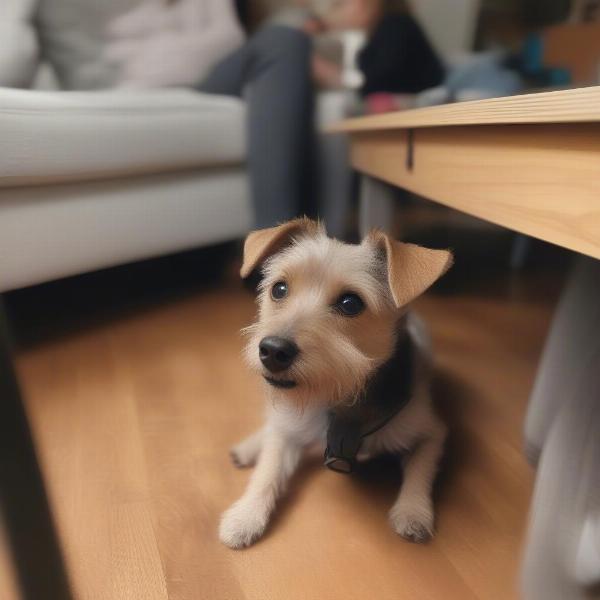Dogs often have their tongues out, and while it’s often a charming quirk, there’s more to it than meets the eye. Understanding why your dog has their tongue out can give you valuable insights into their physical and emotional state. It can range from simple overheating to more serious health concerns. Let’s explore the common reasons behind this canine behavior.
Panting for Temperature Regulation
One of the most common reasons dogs stick their tongues out is to regulate their body temperature. Unlike humans who sweat through their skin, dogs primarily rely on panting. When a dog pants, the rapid inhalation and exhalation of air evaporates moisture from their tongue, nasal passages, and lungs, cooling them down. This is especially important in hot weather or after strenuous exercise.
Is My Dog Panting Because They’re Stressed or Anxious?
Panting isn’t always about temperature. Stress and anxiety can also cause a dog to pant. Pay attention to the context. Is your dog in a new environment, experiencing loud noises, or separated from you? If so, the panting could be a sign of emotional distress. Look for other accompanying signs like whining, pacing, or tucked tail.
 Anxious dog panting
Anxious dog panting
Medical Reasons for a Dog’s Tongue Hanging Out
While most panting is normal, sometimes it can signal an underlying medical condition. Certain breeds, like brachycephalic breeds (those with short noses like Bulldogs and Pugs), are more prone to breathing difficulties and may pant excessively. Other medical conditions such as heart problems, respiratory issues, or even pain can also cause increased panting. If your dog’s panting seems excessive, sudden, or is accompanied by other symptoms like lethargy, coughing, or difficulty breathing, consult a veterinarian immediately.
Hanging Tongue Syndrome: When Tongues Forget to Retract
Some dogs simply have tongues that are too big for their mouths! This is sometimes referred to as “Hanging Tongue Syndrome” and is often seen in breeds like the Cavalier King Charles Spaniel. While it can be endearing, it’s essential to ensure the exposed tongue doesn’t become dry or injured.
Why is My Elderly Dog Panting So Much?
Elderly dogs may pant more frequently due to age-related changes like decreased respiratory efficiency and reduced ability to regulate body temperature. Monitoring their panting and ensuring they have access to cool water and shade is crucial, especially during warmer months. If you’re concerned about your elderly dog’s panting, please read our article on elderly dog panting for more detailed information. Also, be aware of potential choking hazards, particularly with collars, as discussed in our article on dog choked by collar.
Conclusion: Understanding Your Dog’s Panting
Observing your dog’s panting and considering the surrounding circumstances is key to understanding why they have their tongue out. While panting is usually a normal physiological response, it’s crucial to be aware of when it could indicate a more serious issue. By paying close attention and seeking veterinary advice when necessary, you can ensure your furry friend’s health and well-being. Test your dog knowledge with our fun dog trivia questions answers. For more information on dog bites, please refer to our article on scissor bite dog.
FAQ:
- Why does my dog pant after playing fetch? Panting after exercise is normal and helps your dog cool down.
- Is it normal for my dog’s tongue to hang out a little when they’re relaxed? Yes, especially in certain breeds.
- When should I be concerned about my dog’s panting? If it’s excessive, sudden, accompanied by other symptoms, or different from their usual panting.
- Can pain cause a dog to pant? Yes, pain can cause increased panting.
- What should I do if my dog is panting heavily and seems distressed? Contact your veterinarian immediately.
- How can I help my dog cool down if they’re panting heavily? Offer them cool water, move them to a shaded area, and avoid further exertion.
- Do all dogs pant the same way? No, panting can vary depending on breed, size, and individual factors.
About ILM Dog:
ILM Dog is your comprehensive resource for expert advice on dog care, covering everything from breed selection and health to training, nutrition, and grooming. We provide practical tips and insights for dog owners of all experience levels. We also offer valuable resources on specific dog breeds and potential health concerns. For personalized advice and support, reach out to our expert team. Contact us via email at [email protected] or call us at +44 20-3965-8624.